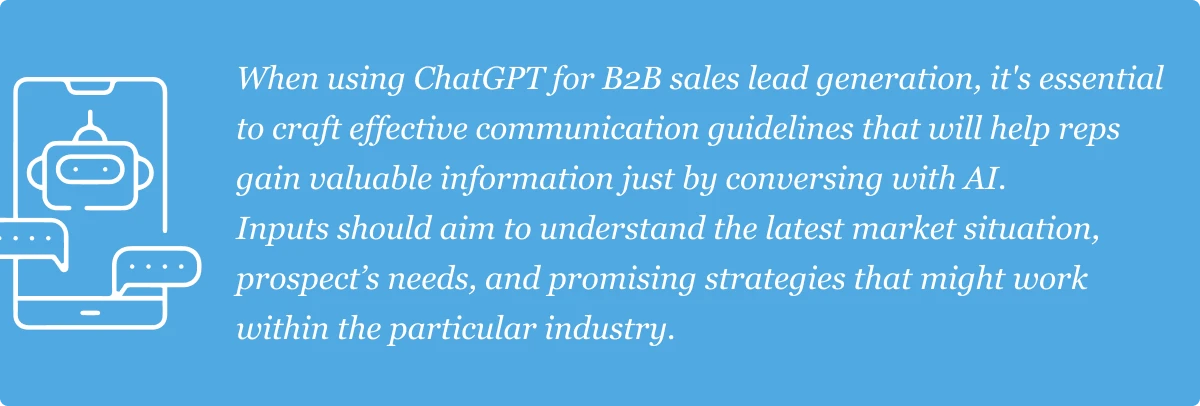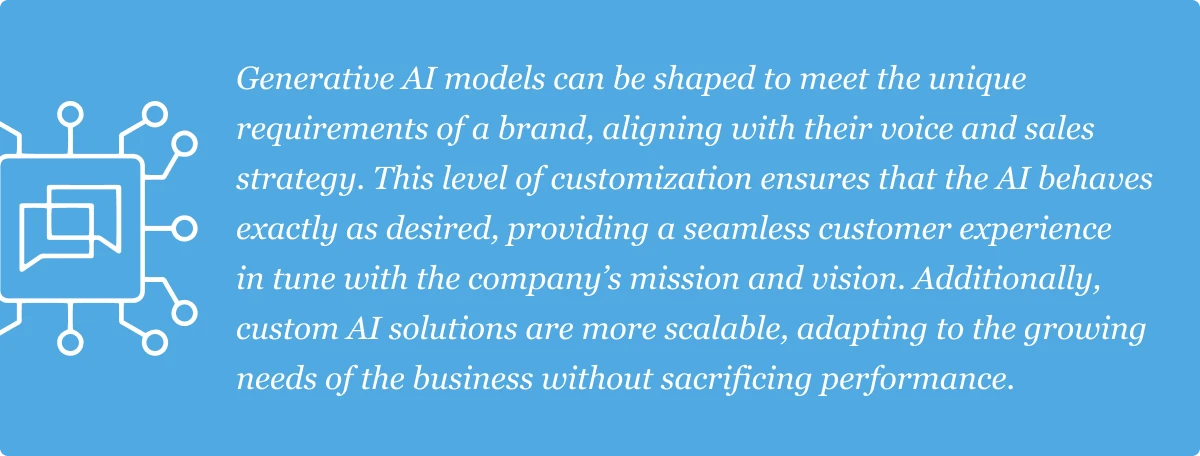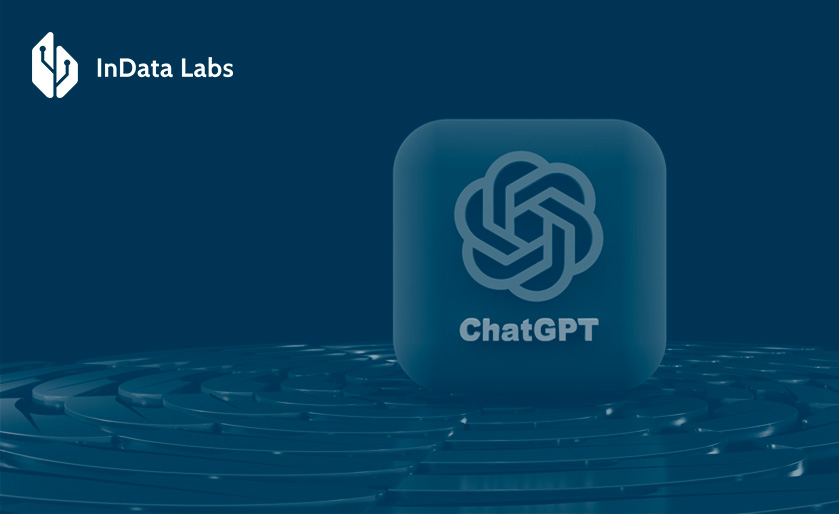We’ve entered an era when AI technology plays a pivotal role in transforming businesses on all possible levels, including companies’ efforts to generate and convert new leads. Using ChatGPT for sales is considered a game-changer for all industries that want to automate their processes, increase the number of clients, and save time for other business tasks.
There are several ways to approach the integration of AI into sales departments. In this article, we will discuss essential ways to improve potential customer interactions and streamline sales operations with the help of ChatGPT. Our goal is to showcase how the digital sales process can be enhanced with the power of AI through chatbots, custom systems, and other innovative solutions.
B2B sales lead generation with AI
Businesses are continuously seeking innovative ways to find new potential customers, reach out to them, and convince them to buy. AI-based tools have emerged as crucial for enhancing customer experiences, automating mundane tasks, and increasing conversion. Their main benefit lies in the ability to provide personalized interactions and be constantly available. This way, they can help businesses build stronger foundations for meaningful relationships with their prospects and ensure that their needs are always met.
ChatGPT, as a versatile AI language model, is ideally suited for sales applications. It has the capability to understand natural language and respond contextually, making it an excellent addition to any sales team. By leveraging ChatGPT, businesses can scale their sales efforts, reaching a broader audience, and freeing up human resources to focus on more strategic tasks.

Source: Unsplash
How to use ChatGPT for sales
There are many ways to utilize ChatGPT for sales processes. We want to take a closer look at each ChatGPT use case and point out the most important factors that brands should consider when introducing AI into their sales teams.
Getting started with ChatGPT for B2B sales
Integrating ChatGPT into the sales department requires careful planning and execution. The first step is to understand the basics of ChatGPT and its capabilities. OpenAI’s tool is powered by algorithms that enable it to understand provided inputs and generate human-like text outputs. The GPT model was trained with vast datasets, which allows it to comprehend diverse contexts and respond intelligently to user queries.
To incorporate ChatGPT effectively, businesses need to integrate it with their existing sales systems, such as CRM platforms or emailing systems. This way, ChatGPT can access relevant customer data, historical interactions, and sales pipelines, enabling it to provide more personalized and adequate responses.
It’s also important to consider data privacy and safety when implementing AI solutions. Businesses must ensure that customer data is protected, and compliance with relevant regulations is maintained throughout the AI integration process and beyond. They should also invest in collaboration with a trustworthy generative AI implementation partner that will prepare the solution with all the required safety measures.
Sales chatbot made with ChatGPT
The main reason why ChatGPT gained such popularity is its low entry barrier due to its intuitive interface and conversational style of usage. Whoever wants to generate new content with ChatGPT, can simply ask the tool for a specific output. That makes it an excellent base for a custom sales chatbot. These AI-powered virtual assistants offer real-time support and personalized interactions. Thanks to tailor-made knowledge databases, such chatbots can discuss only company-related matters and become a helpful guide for leads that visit the website.
Their responsiveness and quick reaction makes prospects feel taken care of and know exactly what to do to purchase a product or a service. By leveraging ChatGPT, businesses can scale their sales efforts, reaching a broader audience, and freeing up human resources to focus on more strategic tasks. The only thing to remember is to strike the right balance between automation and human touch. While chatbots handle routine inquiries and tasks, human sales representatives can provide personalized and empathetic interactions, especially in complex sales scenarios.
Using ChatGPT for sales lead generation
How to generate leads for B2B sales? That can also be partially ChatGPT’s job. Companies can make it work not only with clients but also with their employees.

Questions to ask ChatGPT to gain insight and help salespeople reach out to the right leads should be focused on finding the best approach to finding, convincing, and converting clients. The GPT model can capture essential data that can be used for lead qualification and nurturing. It can also identify potential leads and let sales representatives know what to do to increase their engagement.
Measuring success and continuous improvement
Implementing ChatGPT for sales is not a one-time endeavor. It requires continuous control and tweaks when necessary. To measure the success of AI-powered sales tools, businesses need to track key performance metrics, such as response times, conversion rates, and customer satisfaction scores.
Gathering user feedback is essential for iteratively improving the performance of custom ChatGPT solutions for sales. Customer opinions come in handy when sales reps want to identify the pain points of their process. Extracting information from them can give businesses a direction to refine their AI strategies. Another essential matter here is scalability. To drive better results over time, AI solutions should grow and cover additional activities. Thanks to gathering more data on the GPT model’s performance, companies can enhance it and expand its capabilities to handle more complex interactions.
ChatGPT examples for sales
Let’s explore some examples of how ChatGPT can be used effectively in B2B sales scenarios:
- Lead qualification: ChatGPT can be used to interact with website visitors, asking relevant questions to qualify leads based on their needs, budget, and timeline. It can then route these leads to the appropriate sales representative for follow-up.
- Recommendations: When a potential client is unsure about which product or service suits their requirements, ChatGPT can provide personalized suggestions based on the information gathered from the conversation.
- Answering FAQs: Sales representatives often encounter the same frequently asked questions. ChatGPT can be programmed with adequate responses to handle these queries, saving time and providing consistent information to customers.
- Handling objections: When a prospect raises objections or concerns, ChatGPT can be equipped with persuasive and informative responses to address their apprehensions effectively.
- Customized demos and presentations: ChatGPT can help in tailoring product demos and presentations based on the specific needs and doubts of the potential client, showcasing the features that are most relevant to them.
- Competitive analysis: ChatGPT can offer a quick comparison of the company’s offerings with that of competitors, highlighting unique selling points and advantages.
- Upselling and cross-selling: For existing customers, ChatGPT can analyze their purchase history and suggest relevant upsells or cross-sells that align with their previous interests.
- Handling live chats: During peak hours, ChatGPT can handle initial interactions on live chat, gathering essential information from clients before handing over the conversation to a human representative.
- Identifying pain points: By asking the right questions, ChatGPT can identify challenges faced by potential clients, enabling sales reps to offer tailored solutions.
- Relationship building: ChatGPT can maintain ongoing communication with customers, sending occasional check-ins and valuable content to strengthen the relationship over time.
- Nurturing: After a sales call or meeting, ChatGPT can follow up with personalized messages, additional information, or resources to keep the prospect engaged.
- Customer onboarding: After closing a deal, ChatGPT can provide onboarding assistance, guiding customers through the setup process and helping them get the most out of their purchase.
What’s crucial at all times is to regularly monitor and fine-tune the solution built on the GPT model to ensure accuracy and relevancy in different sales situations. The best way to do that is to collaborate with a seasoned Generative AI development company that will be able to identify areas for improvement. Such a partner is necessary for all brands that want their own tailored ChatGPT sales chatbot or other sales solution.
ChatGPT for Salesforce
Integrating ChatGPT with Salesforce, a leading CRM platform, can amplify the benefits of both tools. Salesforce offers robust features for lead management, customer relationship management, and sales analytics, making it an ideal platform for AI augmentation. Thanks to OpenAI’s API, companies can connect their Salesforce account with the GPT model and build a powerful work environment for their sales departments.
Businesses that enhance their Salesforce CRM with ChatGPT can automate data entry, lead qualification, and follow-up processes. AI can capture relevant lead information and update the Salesforce account in real-time, ensuring that sales representatives have up-to-date data for their interactions.

Source: Unsplash
Moreover, Salesforce and ChatGPT prove themselves to be a powerful duet when it comes to analyzing incoming sales data and gaining deeper insights into customer behavior and sales performance. This data-driven approach empowers sales representatives to make informed decisions and optimize their sales strategies for better results.
Why a custom AI solution?
When it comes to adopting AI solutions for sales, businesses face a critical decision: whether to opt for premade solutions or invest in AI software development to gain a custom tool tailored to their specific needs. We will always recommend the second option for several reasons. While ready-made tools are low-cost and fast to implement, their advantages are highly limited and non-flexible.

Conclusion
ChatGPT has emerged as a powerful tool for revolutionizing B2B sales. By integrating generative AI into the sales process, businesses can not only provide personalized interactions for their customers but also improve their internal processes and enhance the sales departments’ operations. What’s crucial to remember is that the free-to-use ChatGPT interface can’t seamlessly integrate with a company’s sales workflow, which makes it only a basic tool for simple tasks. Developing a custom GPT solution is a much better choice because it can meet the exact need of a company and provide the highest level of data privacy and security.
As businesses continue to embrace AI-driven sales solutions, the future of B2B sales will undoubtedly be shaped by innovative technologies, including ChatGPT. A proactive approach will drive success and growth for businesses across various industries. That’s why it’s essential to book AI consultations now and start incorporating AI into business structures to gain a competitive edge and boost sales operations.
Integrate ChatGPT to facilitate sales game
Help your sales representatives by automating tasks with the help of ChatGPT. Reach out for a consultation today!



